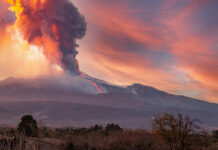
Officials at Lake Mead have issued a stern warning to visitors about the presence of a rare but deadly brain-eating amoeba found in the hot springs. The amoeba, scientifically known as Naegleria fowleri, has been detected in the hot springs below the Hoover Dam, causing concern among local authorities.
Naegleria fowleri, colloquially referred to as the “brain-eating amoeba,” enters the human body through the nose and can cause a fatal infection.
Symptoms of this infection include sudden and severe headaches, fever, and vomiting. The infection is known to have a near 100% fatality rate, making it a significant public health concern.
Brain-Eating Amoeba Found in Lake Mead!#lakemead #nevada #naegleriafiwleri #braineatingamoeba #hooverdam #Jesus #endtimes #news #bible pic.twitter.com/gsfpLJhJxP
— Signs From Above (@signsfrom_above) October 13, 2023
The Lake Mead National Recreation Area advised visitors to avoid diving, splashing water, or submerging themselves in the hot spring waters to prevent exposure to the amoeba.
This year alone, there have been at least four reported deaths in the U.S. due to this infection. It typically occurs when the amoeba enters the nose during submersion in freshwater, usually while swimming.
According to health experts, Naegleria fowleri can cause primary amebic meningoencephalitis (PAM), a deadly condition that destroys brain tissue. From 1962 to 2022, out of the 157 known infections in the U.S., only four individuals survived, indicating a death rate of more than 97%.
In recent cases, a 17-year-old girl from Georgia succumbed to the infection after swimming in a lake with friends. Similarly, a Florida man died after being infected when he washed his face and rinsed his sinuses with tap water containing the amoeba.
Lake Mead officials warn of rare but deadly brain-eating amoeba found present in hot springs https://t.co/VTQsgV2vQO
— Fox News (@FoxNews) October 13, 2023
The amoeba thrives in warm water, with its growth peaking in the months of July, August, and September. Some experts believe that climate change could potentially increase the frequency of Naegleria fowleri infections.
The Centers for Disease Control and Prevention (CDC) states as air temperatures rise, so do water temperatures in lakes and ponds, while water levels may decrease. These conditions create a more favorable environment for the amoeba to grow.
In light of these developments, visitors to Lake Mead are urged to exercise caution when engaging in water-related activities. The presence of this deadly amoeba serves as a stark reminder of the potential dangers lurking in our natural environments.











